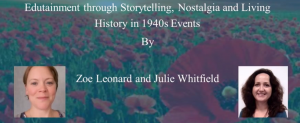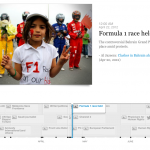Over the past few days, we have seen 80th anniversary D-Day commemorations across the country and worldwide. We have witnessed elements of reenactment, used to highlight the many sacrifices that were made and share a glimpse of what life was like at that time. D-Day was a pivotal moment in World War II “The D-Day landings of 6 June 1944 was the largest seaborne invasion in history” (Royal British Legion, 2024) liberating Western Europe and marking the beginning of the end of the Second World War. This year’s D-Day commemorations were even more poignant, as it will likely be the last major anniversary in which original D-Day veterans will participate. Those of you who have watched just some of the activities over the past few days will have heard original stories of D-Day veterans, shared to educate the generations to come, with the words ‘we will remember’ echoed by so many. With this in mind, we are pleased to share these timely pieces of work that really push the importance of ‘events’ to help us commemorate such historic occasions, keeping history alive.
The first; a paper published in the Event Management Journal “Presenting an Authentic Reflection of the Past Through Storytelling and Living History in 1940s Events”, by Zoe Leonard and Dr Julie Whitfield. Currently available as open access.

Abstract: Live events that replicate the 1940s era celebrate the heritage of a defining moment in history. This research presents the results of a study examining authenticity, storytelling, and living history in the context of 1940s events in the UK. The research demonstrates how storytelling and living history intensify the authentic nature of the event, depicting a true reflection of the past and facilitating a collective memory of the era. Through online semi-structured interviews with event organisers and attendees of 1940s events, the findings confirm that organisers feel a sense of cultural duty to tell an accurate story to the best of their abilities. This is supported through living history as presented by reenactment groups. They provide elements of the three concepts of authenticity: objectivism, constructivism, and existentialism. Reenactors provide historically accurate detail and speak with authority, generating what is perceived to be an authentic level of engagement.
The second; a book chapter “Edutainment through Storytelling, Nostalgia and Living History in 1940s Festivals and Events”, in ‘Festivals and Edutainment’, edited by Giulia Rossetti, Brianna Wyatt, Jane Ali-Knight. 2024
This short video provides a Chapter Summary Edutainment Video.mp4
Both pieces of work stem from the MSc Event Management dissertation of Zoe Leonard, supervised by Dr Julie Whitfield, ‘A critical review of authenticity, storytelling and nostalgia within 1940s events in the United Kingdom, to determine if they present an authentic reflection of the past’.
 Datalabs 3: Digital Storytelling with Data
Datalabs 3: Digital Storytelling with Data










 From Sustainable Research to Sustainable Research Lives: Reflections from the SPROUT Network Event
From Sustainable Research to Sustainable Research Lives: Reflections from the SPROUT Network Event REF Code of Practice consultation is open!
REF Code of Practice consultation is open! BU Leads AI-Driven Work Package in EU Horizon SUSHEAS Project
BU Leads AI-Driven Work Package in EU Horizon SUSHEAS Project ECR Funding Open Call: Research Culture & Community Grant – Apply now
ECR Funding Open Call: Research Culture & Community Grant – Apply now ECR Funding Open Call: Research Culture & Community Grant – Application Deadline Friday 12 December
ECR Funding Open Call: Research Culture & Community Grant – Application Deadline Friday 12 December MSCA Postdoctoral Fellowships 2025 Call
MSCA Postdoctoral Fellowships 2025 Call ERC Advanced Grant 2025 Webinar
ERC Advanced Grant 2025 Webinar Update on UKRO services
Update on UKRO services European research project exploring use of ‘virtual twins’ to better manage metabolic associated fatty liver disease
European research project exploring use of ‘virtual twins’ to better manage metabolic associated fatty liver disease